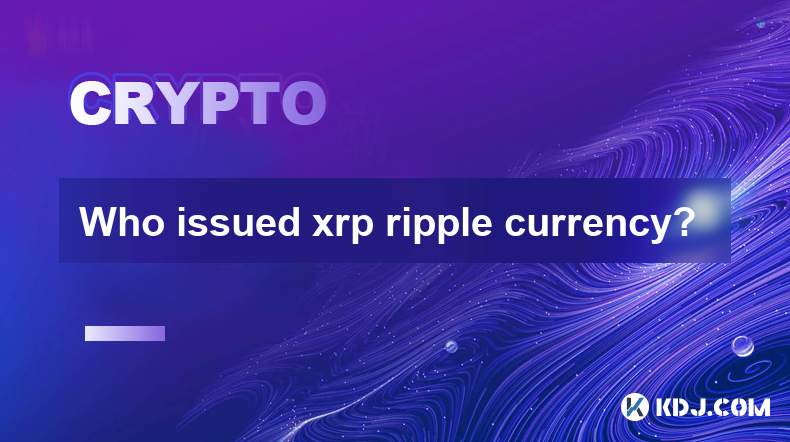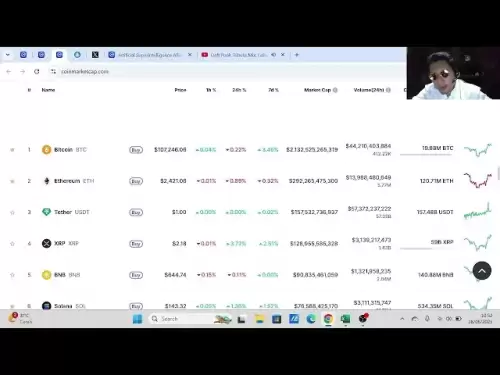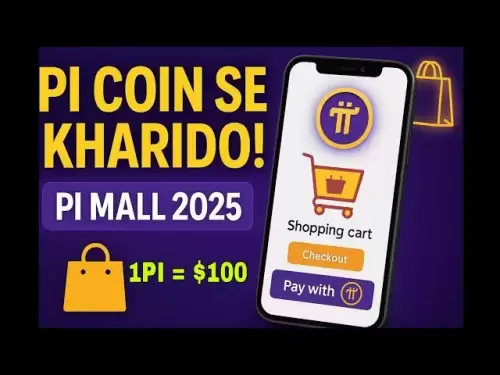-
 Bitcoin
Bitcoin $107,352.1067
0.28% -
 Ethereum
Ethereum $2,429.3531
-0.90% -
 Tether USDt
Tether USDt $1.0001
-0.02% -
 XRP
XRP $2.1894
4.62% -
 BNB
BNB $646.7968
0.36% -
 Solana
Solana $147.4290
4.03% -
 USDC
USDC $0.9998
-0.02% -
 TRON
TRON $0.2756
1.52% -
 Dogecoin
Dogecoin $0.1630
1.14% -
 Cardano
Cardano $0.5612
1.18% -
 Hyperliquid
Hyperliquid $37.0580
-0.05% -
 Bitcoin Cash
Bitcoin Cash $496.9410
-0.09% -
 Sui
Sui $2.7318
3.19% -
 Chainlink
Chainlink $13.1503
0.58% -
 UNUS SED LEO
UNUS SED LEO $9.0766
0.55% -
 Avalanche
Avalanche $17.7220
1.46% -
 Stellar
Stellar $0.2380
1.52% -
 Toncoin
Toncoin $2.8439
0.38% -
 Shiba Inu
Shiba Inu $0.0...01143
1.84% -
 Litecoin
Litecoin $85.8053
1.47% -
 Hedera
Hedera $0.1483
2.70% -
 Monero
Monero $314.3240
2.12% -
 Bitget Token
Bitget Token $4.6725
0.77% -
 Dai
Dai $1.0000
0.00% -
 Polkadot
Polkadot $3.3555
1.28% -
 Ethena USDe
Ethena USDe $1.0001
0.02% -
 Uniswap
Uniswap $7.0890
2.64% -
 Pi
Pi $0.5355
-3.40% -
 Pepe
Pepe $0.0...09393
1.06% -
 Aave
Aave $256.8136
-1.90%
Who issued xrp ripple currency?
Ripple (XRP) serves as a global payment network designed to facilitate swift, cost-effective, and transparent cross-border transactions.
Jan 18, 2025 at 07:12 am

Ripple (XRP): A Beginner's Guide
Hey there, crypto newbie! Welcome to the wild and wonderful world of digital currency. I know it can be a bit daunting at first, but I'm here to guide you through the basics of one of the most popular cryptos out there: Ripple (XRP).
What the Heck is Ripple?
Think of Ripple as a superhighway for money. It's a network that connects banks, payment providers, and other financial institutions, allowing them to send and receive money across borders in a flash.
Who's Behind Ripple?
Ripple was created by a company called Ripple Labs, which is based in San Francisco. Their goal is to make international payments faster, cheaper, and more transparent.
What's XRP?
XRP is the native cryptocurrency of the Ripple network. It's used to facilitate transactions on the network, kind of like gas in a car. The more XRP you use, the faster your transactions will go.
How Does Ripple Work?
When a bank or other financial institution wants to send money across borders, they use the Ripple network. Here's how it goes:
- The sender deposits the money in their Ripple wallet.
- Ripple creates a digital representation of the money called a "marker."
- The marker is sent to the recipient's Ripple wallet.
- The recipient redeems the marker for the actual money in their local currency.
Why Use Ripple?
Ripple has a few big advantages over traditional payment methods:
- Speed: Transactions take seconds, not days.
- Cost: Fees are super low, especially compared to bank wire transfers.
- Transparency: All transactions are recorded on a public ledger, so everyone can see what's happening.
Is Ripple a Good Investment?
Like any cryptocurrency, the value of XRP can fluctuate wildly. But Ripple has a strong team and a solid business model, which makes it a popular choice for investors.
How to Get Started with Ripple
If you're interested in buying XRP or using the Ripple network, here are a few steps to get you started:
- Create a Ripple wallet. There are several different wallets available, so choose one that's reputable and secure.
- Buy XRP. You can buy XRP on cryptocurrency exchanges like Coinbase or Binance.
- Use the Ripple network. Once you have XRP in your wallet, you can send and receive money through the Ripple network.
A Few Things to Keep in Mind
- Ripple is not anonymous. All transactions are recorded on a public ledger.
- XRP is a volatile asset, so be prepared for price fluctuations.
- There are regulatory risks associated with Ripple, so stay up-to-date on the latest news.
Conclusion
Ripple is a promising technology that has the potential to revolutionize international payments. Whether you're an investor or just want to send money abroad faster and cheaper, XRP is definitely worth considering.
Disclaimer:info@kdj.com
The information provided is not trading advice. kdj.com does not assume any responsibility for any investments made based on the information provided in this article. Cryptocurrencies are highly volatile and it is highly recommended that you invest with caution after thorough research!
If you believe that the content used on this website infringes your copyright, please contact us immediately (info@kdj.com) and we will delete it promptly.
- Pi2Day Disappointment: Why the Pi Network Community Is Losing Faith
- 2025-06-28 18:30:12
- Silver Lining: Robert Kiyosaki's July 2025 Silver Prediction
- 2025-06-28 18:30:12
- Gotta Go Fast! Sonic Speeds into Magic: The Gathering Secret Lair
- 2025-06-28 18:50:12
- Bitcoin Price Swings: Navigating Volatility and Predicting the Future
- 2025-06-28 19:10:14
- Meme Coins in 2025: Will Shiba Inu Make a Comeback?
- 2025-06-28 19:30:12
- Pi Network's AI App Studio and Staking Utility: Revolution or Red Herring?
- 2025-06-28 19:30:12
Related knowledge

How to customize USDT TRC20 mining fees? Flexible adjustment tutorial
Jun 13,2025 at 01:42am
Understanding USDT TRC20 Mining FeesMining fees on the TRON (TRC20) network are essential for processing transactions. Unlike Bitcoin or Ethereum, where miners directly validate transactions, TRON uses a delegated proof-of-stake (DPoS) mechanism. However, users still need to pay bandwidth and energy fees, which are collectively referred to as 'mining fe...

USDT TRC20 transaction is stuck? Solution summary
Jun 14,2025 at 11:15pm
Understanding USDT TRC20 TransactionsWhen users mention that a USDT TRC20 transaction is stuck, they typically refer to a situation where the transfer of Tether (USDT) on the TRON blockchain has not been confirmed for an extended period. This issue may arise due to various reasons such as network congestion, insufficient transaction fees, or wallet-rela...

How to cancel USDT TRC20 unconfirmed transactions? Operation guide
Jun 13,2025 at 11:01pm
Understanding USDT TRC20 Unconfirmed TransactionsWhen dealing with USDT TRC20 transactions, it’s crucial to understand what an unconfirmed transaction means. An unconfirmed transaction is one that has been broadcasted to the blockchain network but hasn’t yet been included in a block. This typically occurs due to low transaction fees or network congestio...

How to check USDT TRC20 balance? Introduction to multiple query methods
Jun 21,2025 at 02:42am
Understanding USDT TRC20 and Its ImportanceUSDT (Tether) is one of the most widely used stablecoins in the cryptocurrency market. It exists on multiple blockchain networks, including TRC20, which operates on the Tron (TRX) network. Checking your USDT TRC20 balance accurately is crucial for users who hold or transact with this asset. Whether you're sendi...

What to do if USDT TRC20 transfers are congested? Speed up trading skills
Jun 13,2025 at 09:56am
Understanding USDT TRC20 Transfer CongestionWhen transferring USDT TRC20, users may occasionally experience delays or congestion. This typically occurs due to network overload on the TRON blockchain, which hosts the TRC20 version of Tether. Unlike the ERC20 variant (which runs on Ethereum), TRC20 transactions are generally faster and cheaper, but during...

The relationship between USDT TRC20 and TRON chain: technical background analysis
Jun 12,2025 at 01:28pm
What is USDT TRC20?USDT TRC20 refers to the Tether (USDT) token issued on the TRON blockchain using the TRC-20 standard. Unlike the more commonly known ERC-20 version of USDT (which runs on Ethereum), the TRC-20 variant leverages the TRON network's infrastructure for faster and cheaper transactions. The emergence of this version came as part of Tether’s...

How to customize USDT TRC20 mining fees? Flexible adjustment tutorial
Jun 13,2025 at 01:42am
Understanding USDT TRC20 Mining FeesMining fees on the TRON (TRC20) network are essential for processing transactions. Unlike Bitcoin or Ethereum, where miners directly validate transactions, TRON uses a delegated proof-of-stake (DPoS) mechanism. However, users still need to pay bandwidth and energy fees, which are collectively referred to as 'mining fe...

USDT TRC20 transaction is stuck? Solution summary
Jun 14,2025 at 11:15pm
Understanding USDT TRC20 TransactionsWhen users mention that a USDT TRC20 transaction is stuck, they typically refer to a situation where the transfer of Tether (USDT) on the TRON blockchain has not been confirmed for an extended period. This issue may arise due to various reasons such as network congestion, insufficient transaction fees, or wallet-rela...

How to cancel USDT TRC20 unconfirmed transactions? Operation guide
Jun 13,2025 at 11:01pm
Understanding USDT TRC20 Unconfirmed TransactionsWhen dealing with USDT TRC20 transactions, it’s crucial to understand what an unconfirmed transaction means. An unconfirmed transaction is one that has been broadcasted to the blockchain network but hasn’t yet been included in a block. This typically occurs due to low transaction fees or network congestio...

How to check USDT TRC20 balance? Introduction to multiple query methods
Jun 21,2025 at 02:42am
Understanding USDT TRC20 and Its ImportanceUSDT (Tether) is one of the most widely used stablecoins in the cryptocurrency market. It exists on multiple blockchain networks, including TRC20, which operates on the Tron (TRX) network. Checking your USDT TRC20 balance accurately is crucial for users who hold or transact with this asset. Whether you're sendi...

What to do if USDT TRC20 transfers are congested? Speed up trading skills
Jun 13,2025 at 09:56am
Understanding USDT TRC20 Transfer CongestionWhen transferring USDT TRC20, users may occasionally experience delays or congestion. This typically occurs due to network overload on the TRON blockchain, which hosts the TRC20 version of Tether. Unlike the ERC20 variant (which runs on Ethereum), TRC20 transactions are generally faster and cheaper, but during...

The relationship between USDT TRC20 and TRON chain: technical background analysis
Jun 12,2025 at 01:28pm
What is USDT TRC20?USDT TRC20 refers to the Tether (USDT) token issued on the TRON blockchain using the TRC-20 standard. Unlike the more commonly known ERC-20 version of USDT (which runs on Ethereum), the TRC-20 variant leverages the TRON network's infrastructure for faster and cheaper transactions. The emergence of this version came as part of Tether’s...
See all articles
























































































